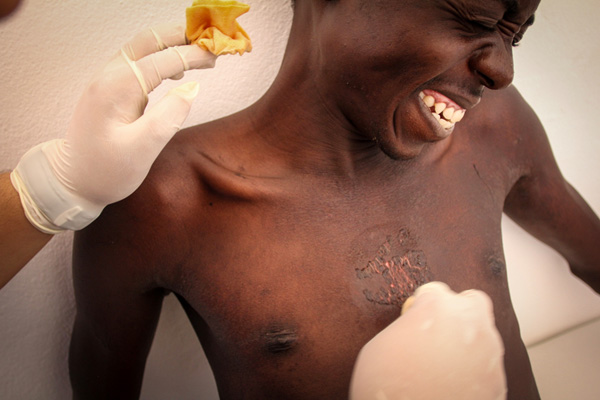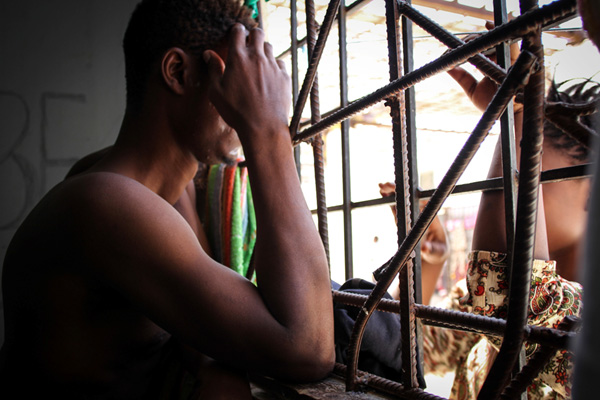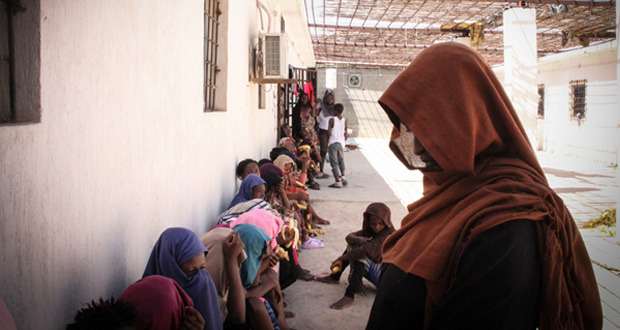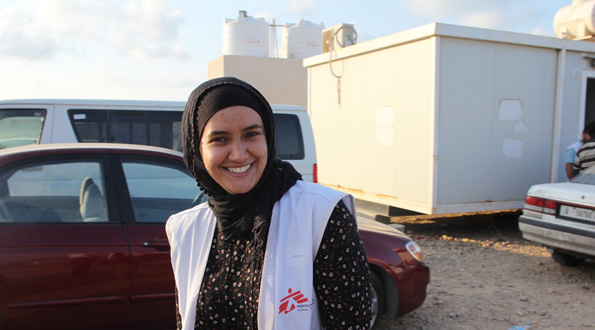It was completely heartbreaking to see people caged up in the detention centres, standing behind bars. Their eyes held nothing. Yet when I spoke to them, every single person had a story. There were child soldiers escaping a horrific life for a new beginning; people longing for an education or more opportunity for their family. They would say to me, “I’ve done nothing wrong – why am I in a prison?”
In Libya, Médecins Sans Frontières/Doctors Without Borders (MSF) is providing emergency assistance and medical care to migrants, refugees and asylum seekers who are caught in a cycle of violence and exploitation. We have two mobile teams working across four detention centres in Misrata, Khoms and Zliten to deliver basic healthcare to people held in centres under the authority of the Directorate for Combatting Illegal Migration. We also have an outpatient clinic in Misrata. In Bani Walid, a region where kidnapping of migrants and refugees and use of torture for ransom is widespread, we have been working in partnership with Libyan actors to run regular medical consultations in a compound for people who are released or escape from the illegal prisons run by traffickers. The patients there have often endured horrific torture and require ongoing care. We organise medical referrals for the most severe cases.

A mother with her two children in a Libyan detention centre. “People are afraid here. There is no freedom for us. My boy was born in prison,” she says. © Sara Creta/MSF
The living conditions in the official detention centres are shocking. You might assume that people arrive in Libya quite sick from fleeing their home countries, but in reality, most of the physical health issues affecting people are directly caused by these living conditions. We are mainly seeing skin conditions like scabies, respiratory tract infections and gastrointestinal problems, linked to unhygienic living conditions, overcrowding and an exceptionally poor diet. We also see old injuries from torture inflicted in Libya and wounds that have worsened due to a lack of treatment. Many people are mentally broken and traumatised by what they have experienced, and by being held in detention indefinitely.
Endless cycle of suffering
During my time working in Libya, on several occasions our team was able to access disembarkation points, where we met people who were brought back by the Libyan coastguard after attempting to escape Libya by boat. We assessed their needs and handed out hygiene kits, which contain shoes, underwear, towels, washing detergent, toiletries, and feminine hygiene products for women. We provided emergency medical care, which often included treating chemical fuel burns, generalised body pain, respiratory tract infections, dehydration, nausea and vomiting (from sea sickness), hypothermia and inhalation of water. We then referred serious or complicated cases to the hospital. The remainder of the people were taken to detention centres by the authorities.

A survivor of a shipwreck off the coast of Libya is treated by medical staff after being transferred to a detention centre. The team treated 18 urgent cases, including nine people suffering extensive chemical fuel burns from the boat, affecting up to 75 percent of the body. © Sara Creta/MSF
In Libya, I became aware of the devastating cycle within which migrants, refugees and asylum seekers became endlessly trapped. We started to see the same people turning up in the boats at disembarkations. As soon as they were brought ashore, people were trying to organise the next boat out. Besides the endless flow of people between the sea and detention, there is a hidden cycle of people trafficking occurring in the detention centres. It is through these cycles that authorities, armed forces and traffickers are all capitalising on the suffering of these vulnerable people, who have virtually no other alternative to leave Libya and continue their journey in search of safety.
“They had disappeared in the night”
There was one patient, a little girl of around eight years old, who was among a group of people I met at a disembarkation point. I told her that when I visited the detention centre her family would be assigned to, I’d bring her some shoes that were her size. When I arrived, she came skipping through the yard to meet me – when I noticed her mother standing behind her with their belongings. I looked around and there were 20 people, all grabbing belongings and walking to waiting cars. The girl said, “We’re going to live in a house in Tripoli!” I realised all these people were being smuggled out in front of my eyes. This was a common occurrence, and it was happening to everyone – men, pregnant women and babies. I knew their names and I knew their faces; I’d built up a relationship with these people as we had cared for them over time. We would attend a detention centre one day, and the next day people were missing. They had disappeared in the night. Sometimes they manage to bribe the guards to get out, or smugglers will bribe guards and organise another attempt to cross the sea. But sometimes people are forced into labour, and they can too easily fall again into the cycle of human trafficking. People would say, “Please send me to a hospital, because I don’t think I’ll be here tomorrow if you don’t.”

A young couple, kept apart in a detention centre, meet over the window when guards allow them. © Sara Creta/MSF
It is an ongoing challenge for MSF to reach people who need our care in Libya; there are so many blind spots. We need to constantly negotiate with the authorities to maintain access to the detention centres. Sometimes, the guards have concealed patients by only bringing certain people to the consultation rooms for us to treat. Follow-up of patients is extremely difficult when we can’t trace where they have been moved.
If MSF wasn’t in Libya providing care, many of these people would likely have no access to medical treatment. We can’t free people from detention. But being there and treating someone for a severe wound or a chest infection, and listening to their story, I could see that we’d at least done something to help that individual in this awful situation. We were able to make their time in that horrible place at least slightly better. We are also doing advocacy and remain committed to expose this terrible cycle of violence, as well as the responsibility of European Union countries, who are deliberately feeding this inhumane system in the name of managing migration and protection of borders.
Jai Defranciscis, a nurse from Queensland, returned from an assignment as nursing activity manager in Misrata, Libya, where Médecins Sans Frontières is providing care for migrants, refugees and asylum seekers facing arbitrary detention and extreme suffering. Médecins Sans Frontières Australia is looking for experienced nurses with training and supervisory experience to work in the field.
Do you have an idea for a story?Email [email protected]
 Nursing Review The latest in heathcare news for nurses
Nursing Review The latest in heathcare news for nurses



Amazing story and amazing contribution. Thank you Jai for your truly inspirational primary health care nurse story.